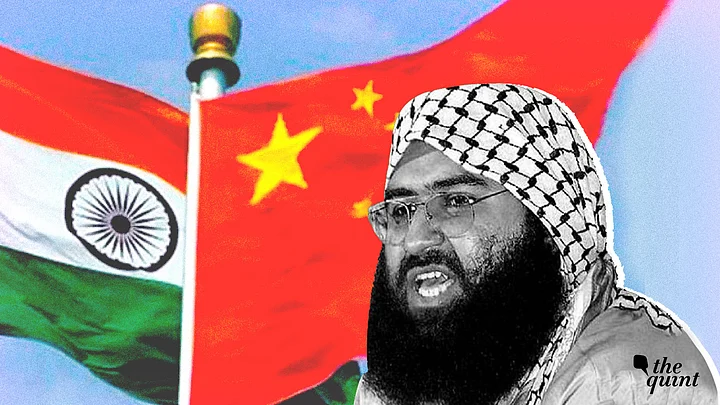There should be little surprise that China has blocked the designation of Jaish-e-Mohammed chief Masood Azhar as a global terrorist once again. It was clear on Monday, when the Chinese official spokesman Lu Kang, read off the usual rigmarole, in response to a question on the listing, “China has all along participated in relevant discussions in a responsible manner and in strict accordance with the rules of procedure and provisions of the (UN’s) 1267 Committee.”
Blocking the move for the fourth time, China sent a note to the UNSC on Wednesday night, saying that it needed more time to examine the request. With this technical hold, the move has been frozen for the next six months.
Why China Blocked Bid to List Masood Azhar as Global Terrorist
China has played a similar role in earlier efforts – in 2009, 2016 and 2017. However, it had gone along with the listing of Lashkar-e-Taiba chief Hafiz Mohammed Saeed and his deputy Zaki-ur-Rehman Lakhvi, in 2009, in the wake of the November 2008 Mumbai attack. Those designated by the Committee have their assets frozen and are prohibited from foreign travel.
Beijing claims that there are some technical and procedural issues that need to be resolved before it can support the move. Yet, other prominent permanent members of the UN’s Security Council—US, UK, and France—backed the move, along with a number of non-permanent members. It is obvious that China’s “deeper than the seas and higher than the mountains” friendship with Pakistan has guided its action.
In his Monday statement, spokesman Lu had said that “China will continue to communicate and work with relevant parties in a responsible manner so as to properly resolve this matter.” It was referring, of course, to Pakistan, where Beijing had, on 6 March, sent Vice Foreign Minister Kong Xuanyou (to Islamabad).
The Chinese were keen to have Kong visit New Delhi as well, but the latter demurred. India is not keen to allow China’s claim that it is mediating on the issue. It did, however, welcome a junior Saudi Minister Adel al-Jubeir to come to New Delhi on Monday, following his earlier visit to Islamabad. But this was ostensibly a follow-up visit to that of the Saudi Crown Prince Mohammad bin Salman in February.
India Needn’t Fret Over China Blocking Anti-Masood Azhar Bid
The Chinese view is that not only should India “exercise restraint”, it should help create an “enabling atmosphere” so that Pakistan can cooperate with others on this issue. China simply ignores Islamabad’s mendacity, if not criminality, in supporting terrorist groups as instruments on foreign policy. But in international relations, it’s interests that matter, not aesthetics.
In line with this, New Delhi has taken the setback on its chin. Expressing disappointment over the development, it has been careful to avoid naming China in its official statement, following the Chinese hold. All it has said is that “a member” of the 1267 Committee had placed the proposal on hold.
India had hoped that this time around, Beijing would cooperate. It had, after all, made a major shift in its posture towards China through the Wuhan Summit. This shift involved an informal Indian commitment to abjure from using the “Tibet card” with China. Incidentally, in 2016, when Beijing had put a hold, New Delhi had named Beijing and excoriated it for not showing greater “understanding of the danger posed to all by terrorism.”
It would be foolish for New Delhi to get worked up about the Chinese hold. The listing by itself does little to restrain either Islamabad or the terrorists. After all it has meant little that Hafiz Saeed has been on the list since 2009, or that the Jaish as an organisation has been on the list since 2001. Terrorism and terrorists are not fought by paper listings, but through kinetic actions.
There is certain value to the listing, but only if it is taken in conjunction with other actions, which include wider diplomacy, covert action, air strikes and ground attacks on terrorist facilities.
Getting China Around to Pressurise Pakistan Isn’t Impossible
New Delhi has now learnt that it cannot work its international relations or counter-terrorist policy along with its election cycle. The project of getting China around to pressure Pakistan needs to be pursued along its own time-line, just as the goal of persuading Pakistan to abandon the instrumentality of terrorist proxies.
There are enough indications that this is not an impossible task. India was able to bring around Beijing to placing Pakistan on the FATF ‘grey list’ in this manner. And, after all, Beijing did act against Hafiz Saeed and Lakhvi.
In an interview with The Hindu the former Indian Ambassador to China, Gautam Bambawale had noted that India’s only option to a Chinese barracking was to keep trying. He suggested that India needed to be more transactional, and perhaps look for things Beijing would like in exchange for the Azhar listing.
The global community’s response to the Pulwama attack and the Indian response was generally sympathetic. There are enough indications that countries like the US, Saudi Arabia and China, all friendly to Islamabad, are nudging Pakistan in the right direction. India needs to keep working with them, just as it does need to keep sharpening its more kinetic instruments to deal with terrorists.
(The writer is a Distinguished Fellow, Observer Research Foundation, New Delhi. This is an opinion piece and the views expressed are the author’s own. The Quint neither endorses nor is responsible for them.)
(At The Quint, we question everything. Play an active role in shaping our journalism by becoming a member today.)
